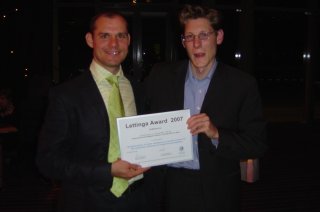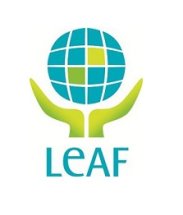
2007 - The 3rd Lettinga Award
Focus for call 2007
The focus of this call was for proposals related to the chemical industry. The chemical industry is faced with an ever-pressing need to find cost effective and sustainable solutions for wastewater treatment. Anaerobic technologies offer important potentials for removing organic pollutants from high strength industrial effluents. However, as effluents from the chemical industry may contain compounds that are recalcitrant or affect the treatment process, many challenges remain as to the application of anaerobic treatment technology.
Dr. Francisco J. (Paco) Cervantes of the Instituto Potosino de Investigación Científica y Tecnológica (IPICYT) in Mexico was the winner of the Lettinga Award 2007. The jury representative, Dr. Jaap Vogelaar of Paques, The Netherlands handed the award to Dr. Cervantes in a special session dedicated to the Lettinga Award during the IWA Anaerobic Digestion World Conference Brisbane, Australia, September 23-27 (AD-11). Over 350 participants were present at AD-11 of which the majority attended the award session during the conference banquet.
The Lettinga Award session started off with Prof.dr. Jules van Lier explaining the mission of LeAF and the rationale behind the Lettinga Award. Thereafter, Dr. Jaap Vogelaar passed the judgment of the jury on the winning project proposal. This edition of the Lettinga Award had a special focus on anaerobic wastewater treatment in the chemical industry. According to the jury, the prize winner Francisco Cervantes certainly meets this criterion as he addresses recalcitrant components like aromatics and halogenated solvents from chemical effluents. These effluents are persistent in conventional systems and on release there would be a severe impact on the environment. Francisco Cervantes suggests that immobilizing redox mediators on nano-structures could be a step towards economic application of these processes. Different researchers, among which Francisco Cervantes, showed that the introduction of these mediators has great potentials for reductive transformation of highly oxidized compounds into non-toxic substances in anaerobic systems. However, up to now, continuous addition of these dissolved mediators does not appear to be an operational cost effective option. More research is required to achieve this and the Lettinga Award jury felt that Francisco Cervantes wrote an excellent proposal dealing with fundamental screening of mediators and appropriate nano-structures with the aim to immobilize the mediators, combined with well designed lab scale experiments. The jury stated that Francisco Cervantes has the appropriate scientific basis to bring such a type of research work to a success. And by funding Francisco Cervantes and this research the committee hopes to contribute to a new line of research, which will give an outlook on effective treatment of persistent pollutants in the future.
Francisco Cervantes promised to complete his research on December 31, 2010. One of the obligations that comes along with winning the €25,000 prize is that Francisco will present the results of his project at the next IWA Anaerobic Digestion Congress (AD12).
